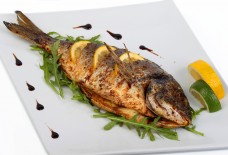Traditional Arab Sports
By: Pamela Dimitrova/Arab America Contributing Writer
Sports in any country are promoted due to the health benefits of them among other reasons. These activities serve as entertainment and cultural tie-ups between people for the love of the games.
Sports in Arab countries are prominently related to the desert sand where camels and horses rule the roost. People flock together as they watch various traditional sports amongst which the famous ones are camel racing and various forms of equestrianism. Take a look at a few of the most popular traditional Arab sports!
Falconry
Once an integral means of survival in the desert, falconry has evolved into a highly-skilled sport, with rewards for those adept at training the birds, and a high value placed on the most beautiful specimens.
In the past, falconers hid in holes in the sand to trap wild birds and train them to hunt, then set them free at the end of the hunting season in March. These days, most birds breed in captivity, and they go for more than Dh500,000 each.
Sheikh Zayed, the Founding President of the UAE, was fond of hunting expeditions with tribesmen and their falcons in tow as a way of bonding with his people.
While hunting for food is no longer a necessity, many Emiratis still keep falcons as pets and love to head into the desert for camping expeditions.
Skills in training falcons with live prey (tilwah) and with lures, as well as skills with younger falcons (faroukh). There has been backlash from international animal welfare organizations because of the illegal ‘breeding’ of falcons and import of the birds from other countries. This has not seemed to stop the sport.
Camel Racing
Camel racing is a traditional Arab sport that is a part of native lives for hundreds of years. Mainly two types of camels are used Omani and Sudania for this sport where they differ only in color. They are fed on a typical diet of dates and milk and made to run certain distances to build their stamina.
It was initially a long-established part of weddings and special events. But now the sport now has been given formal status with customized 15 race tracks across the UAE equipped with high tech facilities. Some of the famous ones are Nad Al Sheba Racecourse, 10 kilometers outside of Dubai, and Al Wathba outside of Abu Dhabi. Customarily underage boys were used as human jockeys but due to wide condemnation from Human Rights Organization, they have now been replaced by robots, which is a welcome move.
The animals race up to 4km and 10km, controlled by robot jockeys operated by their owners or trainers, who drive alongside the track in off-road vehicles. Morning races often feature camels owned by royalty, and there are big cash and gift prizes for winners.
Freediving
Highly skilled divers endured months of hardship and risked possible death to search for the pearls, which were once the main source of income for the Emirates in the pre-oil era. Spending months at sea, divers went as far down as 30 meters for as long as three minutes each time, 40 times a day.
The industry, which can be traced back to the 12th century, died out with the development of cultured pearls in the 1920s.
Its modern-day equivalent, freediving, has since gained popularity worldwide. Fazza Freediving champion Branko Petrovic, originally from Serbia, set a Guinness World Record in the sport in Dubai in 2014 by holding his breath underwater for 11 minutes 54 seconds.
Saluki Racing
The Arabian Desert saluki is one of the oldest dog breeds in the world. The breed was once used by Bedouin tribes to hunt for food, as well as keeping people company as they trekked across the desert.
Saluki racing has been practiced in the Middle East region for about two decades, and now involves big prize money, particularly at championships held by the HHC and in the Arab Heritage Saluki Race Festival in the Western Region.
The sport was practiced originally by royal families, it’s similar in style to greyhound racing. It takes place year-round, mostly at camel racetracks such as Sweihan, near Abu Dhabi, and Al Marmoum in Dubai.
The salukis can cost up to Dh400,000 each. Winners can take home up to Dh100,000 per race in prize money. The dogs, which can reach speeds of 65kph, race after bait carried by four-wheel-drive vehicles.
Check out Arab America’s blog here!









